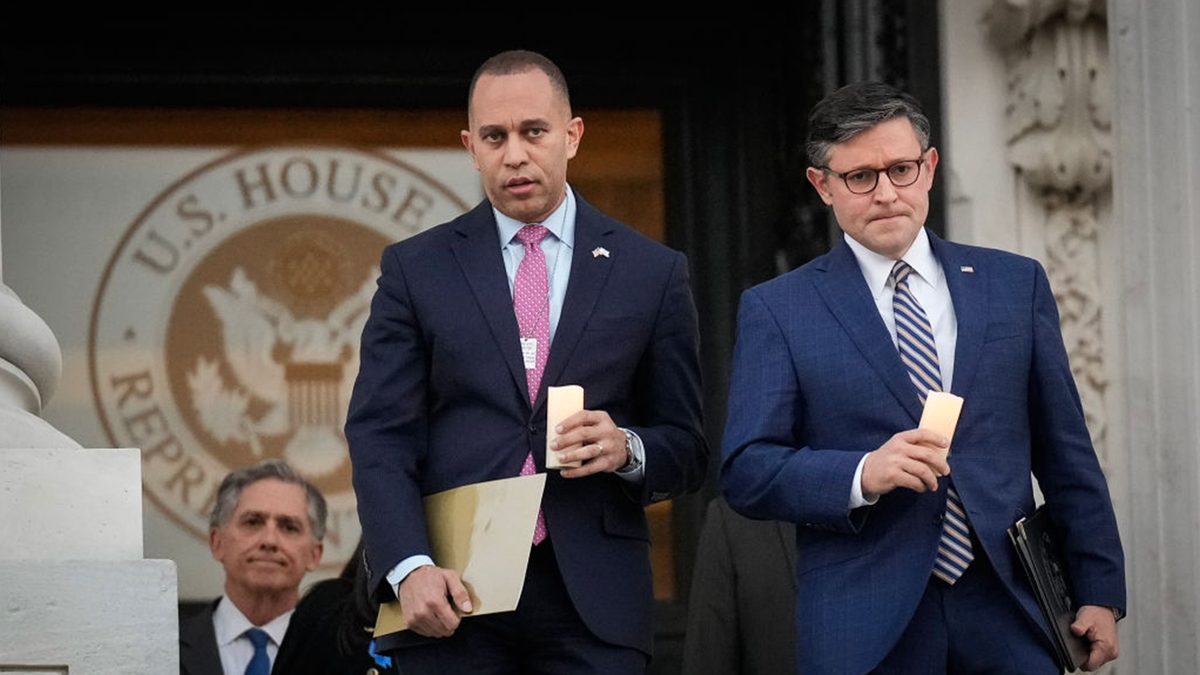The Supreme Court will hear arguments Wednesday in a high-profile case involving the right of transgender minors to receive gender transition care, such as puberty blockers and hormone therapy, in one of the most closely watched, potentially impactful cases slated to come before the high court this year.
The case, United States v. Skrmetti, centers on a Tennessee law that bans gender-transition treatments for adolescents in the state. The law also takes aim at health care providers in Tennessee who continue to provide gender-transition treatments to transgender minors, opening them up to fines, lawsuits and other liability.
The petitioners in the case are the American Civil Liberties Union (ACLU), which sued to overturn the Tennessee law on behalf of parents of three transgender adolescents, and a Memphis-based doctor who treats transgender patients. The petitioners were also joined by the Biden administration earlier this year under a federal law that allows the administration to intervene in certain cases certified by the attorney general to be of ‘general public importance.’
The petitioners argue the law violates the Equal Protection Clause of the 14th Amendment. The state has responded by insisting the law does not discriminate based on gender, arguing it sets parameters on age- and use-based restrictions on certain drugs and is therefore not a violation of the Constitution.
According to the U.S. Supreme Court website, the key question posed in the case is ‘whether Tennessee Senate Bill 1 (SBl), which prohibits all medical treatments intended to allow ‘a minor to identify with, or live as, a purported identity inconsistent with the minor’s sex’ or to treat ‘purported discomfort or distress from a discordance between the minor’s sex and asserted identity,’ Tenn. Code Ann. § 68-33-103(a)(1), violates the Equal Protection Clause of the Fourteenth Amendment.’
Wednesday’s oral arguments mark the first time the Supreme Court will consider restrictions on puberty blockers, hormone therapy and surgery for minors, giving the case importance in Tennessee and in other states across the country.
Tennessee passed its law, Senate Bill 1, in March 2023. But it is just one of at least 25 U.S. states that has banned gender transition care for transgender adolescents, making the case — and Wednesday’s oral arguments — one of the most high-profile cases to be heard this session.
The oral arguments have been anticipated for months. The controversial case comes at a time in Washington when Republicans will regain control of the White House and both chambers of Congress next month, giving them heavy influence and, some fear, more control over the federal judiciary.
Here’s what you need to know ahead of Wednesday’s oral arguments.
The petitioners will be represented by U.S. Solicitor General Elizabeth Prelogar and Chase Strangio, an ACLU attorney who represented the original parties in the lawsuit.
Strangio, the deputy director for transgender justice for the ACLU’s LGBTQ and HIV Project, will be the first openly transgender person to argue before the Supreme Court.
The respondents in the case, namely the state of Tennessee, will be represented in court by Tennessee Solicitor General J. Matthew Rice and the state attorney general, Jonathan Skrmetti.
In a court filing submitted ahead of Wednesday’s oral arguments, Prelogar’s office argued the Tennessee law has a deliberate focus on ‘sex and gender conformity,’ asserting Senate Bill 1 ‘declares that its very purpose is to ‘encourag[e] minors to appreciate their sex’ and to ban treatments ‘that might encourage minors to become disdainful of their sex.”
‘That,’ the federal government wrote, ‘is sex discrimination.’
Counsel for the petitioners will argue that the Tennessee law imposes ‘differential treatment based on the sex an individual is assigned at birth,’ triggering a higher level of scrutiny under the Equal Protection Clause of the Constitution.
They will also argue that upholding the ban will represent a ‘dangerous and discriminatory affront’ to transgender minors not just in Tennessee, but across the country, a point that has been emphasized by Strangio.
The state argued in a court filing that the law ‘contains no sex classification’ warranting the heightened scrutiny under the Equal Protection Clause. Rather, it said, it ‘creates two groups: minors seeking drugs for gender transition and minors seeking drugs for other medical purposes.’
The Supreme Court has determined three different levels of scrutiny that help determine whether a law is permissible under the Equal Protection Clause of the Constitution: Strict scrutiny, heightened scrutiny and rational basis. The highest level, strict scrutiny, requires a law be passed to serve a compelling government interest and be narrowly tailored to minimize harm.
The second level of scrutiny, or ‘heightened scrutiny,’ requires the governmental body to prove its actions further an ‘important government interest’ by using means ‘substantially related to that interest.’
The lowest bar, rational basis, is the most deferential of the tests and requires the law only serve a legitimate interest with a ‘rational connection’ to the means and goals of the statute.
Wednesday’s oral arguments will center on whether banning gender transition care for minors violates protections under the Equal Protection Clause, either via gender discrimination or discrimination against their transgender status.
The petitioners in the case will argue that the Tennessee law discriminates against individuals and their right to receive the same medical treatments based on their sex. Under the law, the petitioners argued in their court filing, ‘an adolescent assigned female at birth cannot receive puberty blockers or testosterone to live as a male, but an adolescent assigned male at birth can.’
Separately, they will argue that discriminating against individuals based on their transgender status is also sufficient to trigger higher scrutiny under the Equal Protection Clause, noting that transgender individuals ‘satisfy all of the hallmarks of a quasi-suspect class,’ including being subject to discrimination, representing a ‘discrete and identifiable minority’ and other components outlined by the Supreme Court, thereby necessitating that heightened scrutiny be applied.
The respondents will argue that Senate Bill 1, places age- and use-based restrictions on certain drugs and, therefore, is not an example of unconstitutional discrimination.
Further, they will argue that the law easily passes even the test of heightened scrutiny. The state contends it has ‘compelling interests’ to protect the health and safety of minors in the state and ‘in protecting the integrity and ethics of the medical profession.’
U.S. District Judge Eli Richardson, a Trump appointee, granted a preliminary inunction for part of the Tennessee ban in June, siding with the petitioners’ assertion that ‘parents have a fundamental right to direct the medical care of their children, which naturally includes the right of parent[s] to request certain medical treatments on behalf of their children[.]’
He said the ban on most types of gender care for transgender minors would likely not survive the heightened scrutiny test under the Equal Protection Clause, since the same treatments were not banned for their non-transgender peers.
The U.S. Court of Appeals for the 6th Circuit later overturned the district court’s decision and reinstated the full ban, using the lowest test of rational basis. The petitioners appealed that decision to the Supreme Court, which agreed in June to review the case.
The petitioners have asked the Supreme Court to remand the case to the 6th Circuit Court to hear it again, this time using the test of heightened scrutiny.
Strangio has repeatedly stressed the wide-ranging impact the Supreme Court decision could have on ‘countless transgender youth’ of current and future generations and has described the bans as a ‘dangerous and discriminatory affront to the well-being of transgender youth across the country.’
The Supreme Court is expected to rule on United States v. Skrmetti by July 2025. The Supreme Court typically issues summer decisions on cases argued during the October term.







